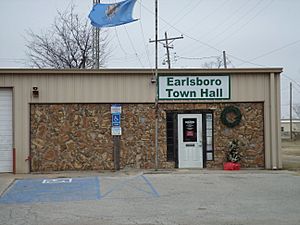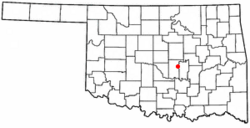Earlsboro, Oklahoma facts for kids
Quick facts for kids
Earlsboro, Oklahoma
|
|
|---|---|

Earlsboro Town Hall
|
|
| Nickname(s):
The Boro
|
|

Location of Earlsboro, Oklahoma
|
|
| Country | United States |
| State | Oklahoma |
| County | Pottawatomie |
| Area | |
| • Total | 9.31 sq mi (24.11 km2) |
| • Land | 9.29 sq mi (24.07 km2) |
| • Water | 0.02 sq mi (0.04 km2) |
| Elevation | 1,017 ft (310 m) |
| Population
(2020)
|
|
| • Total | 594 |
| • Density | 63.92/sq mi (24.68/km2) |
| Time zone | UTC-6 (Central (CST)) |
| • Summer (DST) | UTC-5 (CDT) |
| ZIP code |
74840
|
| Area code(s) | 405 |
| FIPS code | 40-22500 |
| GNIS feature ID | 2412458 |
Earlsboro is a small town located in Pottawatomie County, Oklahoma, in the United States. In 2020, about 594 people lived there. Earlsboro was once known as "the town that whisky built and oil broke," which tells you a lot about its interesting past!
Contents
History of Earlsboro
How Earlsboro Started
The town of Earlsboro began in 1891. This was when a railway company, the Choctaw Coal and Railway, built a train line. This line went west from the Seminole Nation into an area called Oklahoma Territory.
Earlsboro was located just half a mile inside Oklahoma Territory. It was named after James Earls. He was a local African American man who had worked for a general during the Civil War. The town's name was first spelled "Earlsborough." But it changed to Earlsboro when the post office opened on June 12, 1895.
Early Growth and Changes
The town grew quickly at first. This was because the nearby Indian Territory had different laws. In Indian Territory, certain businesses were not allowed. But in Oklahoma Territory, they were. The first three businesses in Earlsboro were places that sold drinks. Many customers came from Indian Territory to visit these businesses. By 1905, about 500 people lived in Earlsboro.
When Oklahoma became a state, the laws changed for everyone. This caused Earlsboro's population to drop to 387 people. After this, the town's economy focused more on farming.
The Oil Boom and Bust
A big change happened on March 1, 1926. Oil was discovered nearby! The first oil well produced 200 barrels of oil every day. News of the oil discovery brought many workers to Earlsboro. In just two months, the town's population grew to an estimated ten thousand people!
This oil boom led to a lot of building. A large hotel and a big theater were built. Many new businesses opened. In 1929, the town even raised money to build a water and sewer system. By 1930, the official population was 1,950.
However, the oil boom did not last forever. Oil production dropped sharply in 1932. Many people who had moved to Earlsboro left. They abandoned their homes and businesses. The town faced serious money problems because it could not pay its debts. In 1959, a newspaper reported that Earlsboro "was the town that whisky built and oil broke." This phrase shows how much the town's economy depended on these two things.
Recent Events
On May 4, 2022, two tornadoes hit Earlsboro. An EF2 tornado struck the southeastern part of town. It then looped around and hit the eastern half, damaging homes and power lines. Another EF1 tornado also caused damage nearby.
Geography
Earlsboro covers a total area of about 9.2 square miles (24.11 square kilometers). Most of this area is land. Only a very small part, about 0.02 square miles (0.04 square kilometers), is water.
Population Information
How Many People Live Here?
The number of people living in Earlsboro has changed a lot over the years. Here's a quick look at the population from different census counts:
- 1910: 638 people
- 1920: 317 people
- 1930: 1,950 people (during the oil boom!)
- 1940: 486 people
- 1950: 278 people
- 1960: 257 people
- 1970: 248 people
- 1980: 266 people
- 1990: 535 people
- 2000: 633 people
- 2010: 628 people
- 2020: 594 people
As of 2010, there were 628 people living in Earlsboro. The town had about 68 people per square mile.
Education
Most students in Earlsboro attend schools in the Earlsboro Public Schools district. Some parts of the town are also in the Strother Public Schools district. A small area is part of the South Rock Creek Public School district for elementary students.
Notable Residents
Many interesting people have come from Earlsboro, including:
- Oleta Crain, an African-American military officer and federal worker.
- Ival Goodman, a baseball player who was an MLB all-star.
- Joe Liggins, a rhythm and blues (R&B) pianist.
- Jimmy Liggins, an R&B guitarist and Joe Liggins's brother.
- Ernest McFarland, who became the Governor of Arizona and a Senate Majority Leader from Arizona.
- Willie Stargell, a famous baseball player who is in the Hall of Fame.
Notable Events
The podcast Song Salad talked about Earlsboro in one of their episodes. This happened in June 2017. You can listen to it here: [1]
See also
 In Spanish: Earlsboro (Oklahoma) para niños
In Spanish: Earlsboro (Oklahoma) para niños
 | William M. Jackson |
 | Juan E. Gilbert |
 | Neil deGrasse Tyson |

